Example use case: Interview transcription
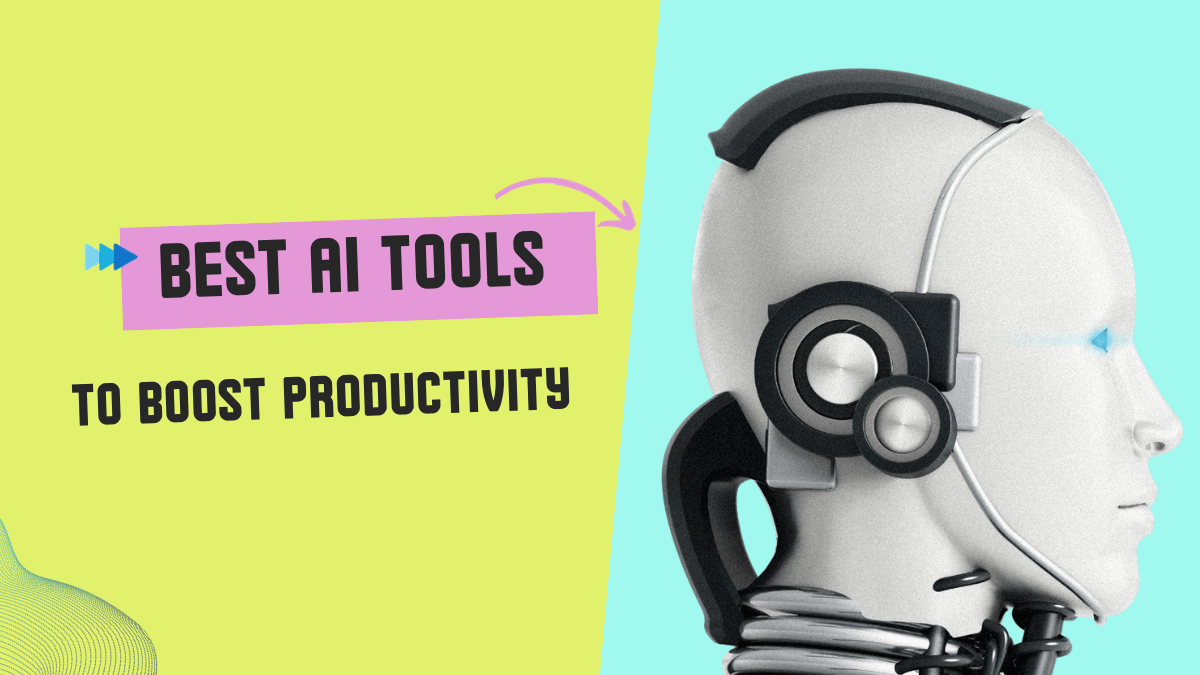
24 AI Productivity Tools & Apps to Supercharge Efficiency
Unlock the power of AI — Notta's meeting assistant records, transcribes and summarizes meeting minutes with one click.
The release of ChatGPT took the world by storm back in late 2022, leaving a lasting change in the way we work. The rapid evolution of new AI tools for productivity that followed has helped teams be more agile and efficient, with individuals, teams, and organizations leveraging them to transform their workflows.
If you’re still not sure which AI tools to include in your tech stack to save you time and make your team more productive, I’ve got you covered.
I’ve analyzed the AI productivity tools on the market today and have curated a comprehensive list of the 24 best solutions available in 2025. The list includes tools that help with content writing, image generation, note-taking, and more—helping you work smarter, not harder.
The best AI productivity tools by category
There are droves of AI tools out there, and it would be impossible for you to test them all yourself.
The list of the best AI productivity tools you’re about to explore was compiled using in-depth research to help you find the best tools available. I’ve divided it into categories based on each tool’s use case:
AI notetakers (Notta, Otter.ai, Fireflies.ai)
Email marketing tools (SurveySparrow, Mailmondo, Clean Email)
Chatbots (ChatGPT, Claude 3)
AI content writing tools (CopyAI, Jasper, Quillbot)
AI image and art generators (Dall-E 2, Midjourney, Adobe Firefly, Canva)
AI tools for video creation (Pictory, Synthesia, InVideo)
AI tools for presentations (Decktopus, Beautiful.ai)
AI tools for education (Gradescope, Socratic)
AI tools for task and project management (Asana, Basecamp)
AI notetakers
The ideal AI notetaker will generate accurate and automated notes for your conversations and store them for future reference. This allows participants to stay focused in the conversation without losing any important information.
I researched and tested a handful of popular note-taking tools available based on the following factors:
Intuitiveness and easy implementation
Quality of transcription
Integrations with third-party systems
The tools we chose stood out as the best AI productivity app options for note-taking.
Notta
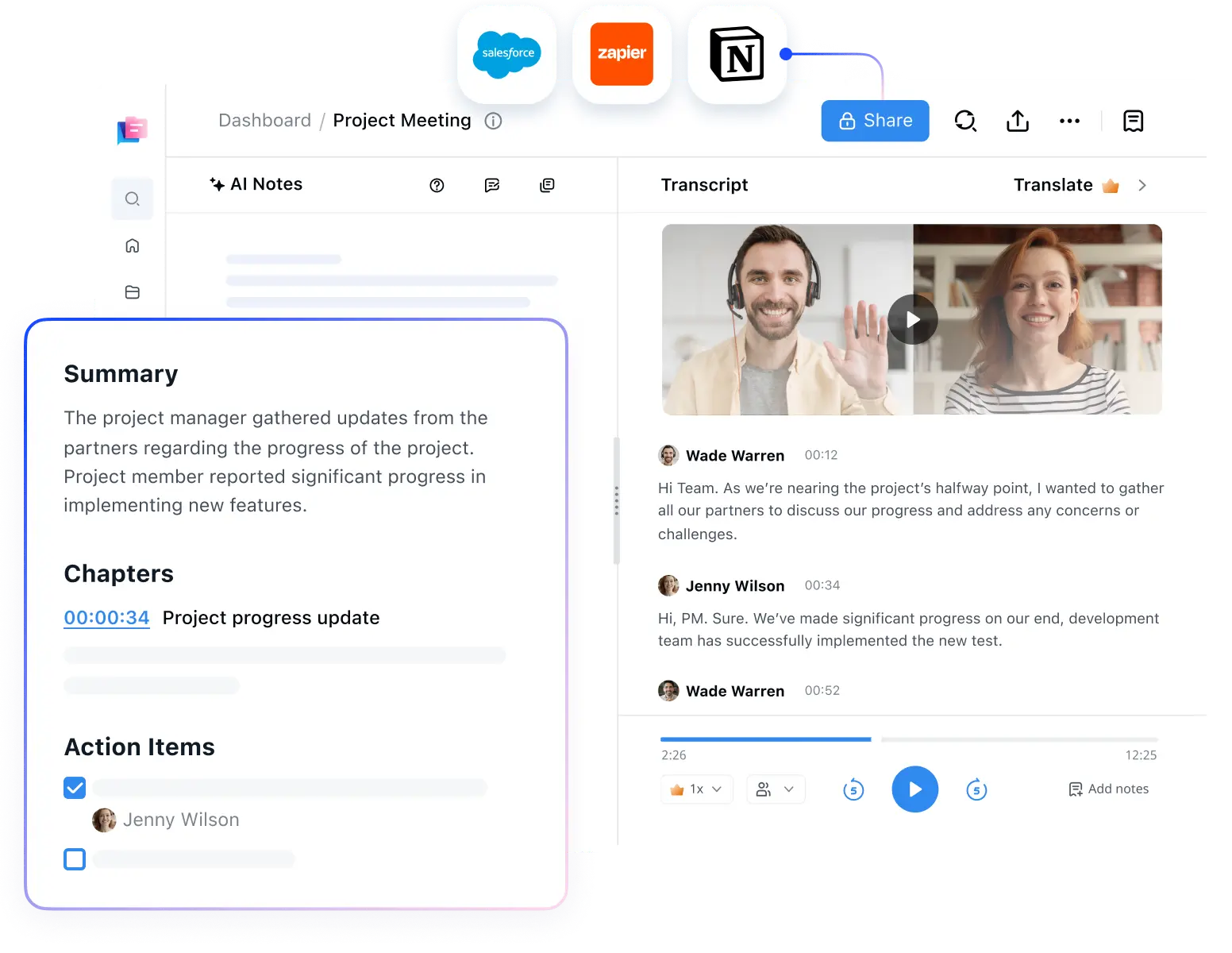
Our top pick AI transcription is your one-stop automatic note-taking tool for live meetings, podcasts, interviews, and other audio and video sources. It automatically records, transcribes, and summarizes your meetings to help you grasp everything from the discussion.
The best part? It also converts these transcripts into actionable AI-powered insights, including:
Meeting summaries
Chapters
Action items
Notta is available as a web app and Chrome extension, as well as an iOS and Android mobile app, so you can access it anywhere. The tool offers transcription accuracy of up to 98.86%, making it a reliable tool for automated note-taking.
Top features
Converts audio to text in real-time with timestamps and auto-corrections
Supports transcription of 58 languages, including English, Japanese, French, and Spanish
Offers a collaborative workspace where you can easily share transcripts and co-edit with your team
Export your transcript in various formats, including TXT, Word, PDF, and SRT
Uses advanced AI to generate a comprehensive and structured summary from the transcript, saving you time in tidying up your notes
Records your meetings from your screen and webcam and lets you share the recording using a cloud link
AI templates for transcribing and summarizing meetings
Integrates with popular video conferencing platforms like Google Meet, Microsoft Teams, and Zoom to help you schedule meetings
Academic transcription services for students and researchers
Notta helps writers and researchers convert interviews into useful nuggets of information—which they can then craft articles from. It works well with both offline and online interviews—and generates accurate transcripts that identify different speakers.
Never miss a detail again with Notta’s advanced AI tool for meeting and notes transcription. Take notes smarter, not harder.
Otter.ai
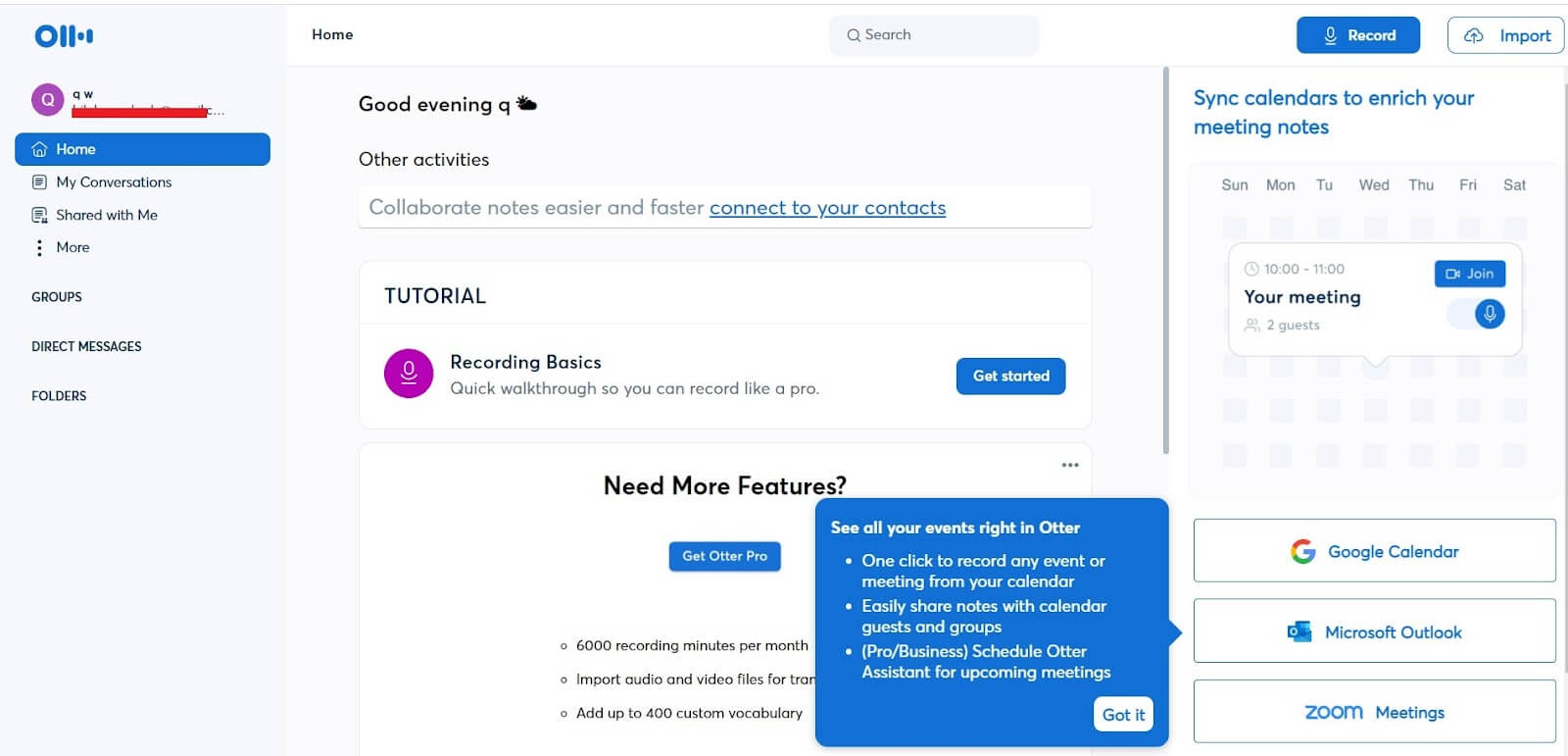
Our next tool is Otter, a renowned transcription platform that automatically transforms spoken language into written text, ensuring the accurate documentation of essential details for future reference and analysis.
Top features
Transcribes live meetings and recorded video/audio files (just note that it only supports English)
Build a custom vocabulary to add special terms related to your business and increase transcription accuracy
OtterPilot AI meeting assistant, which provides automated meeting notes and summaries with action items
Example use case: Makes e-learning easy
Otter is useful for neurodiverse students as it helps them record lecture notes while following audio lessons and lectures. They can store these recordings and transcripts on their devices and even upload audio recordings from their offline lessons for automated notes and summaries.
Fireflies.ai
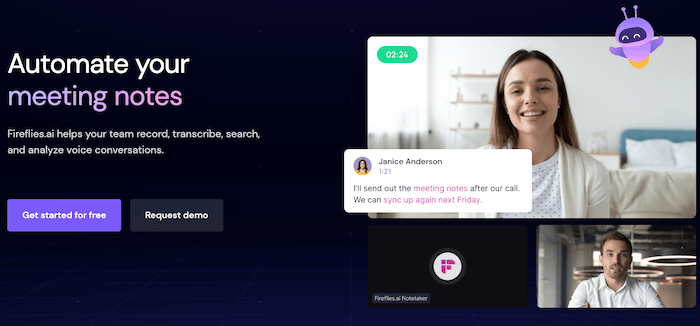
Fireflies.ai is an AI meeting note-taker that allows you to record meetings over platforms like Zoom and Google Meet and generate complete transcripts that you can reference later.
It also provides automated meeting summaries, saving you the time of having to watch the whole session to understand the key points of the conversation.
Top features
Create automated transcriptions with an accuracy of up to 90%
Supports multiple languages, including French, Spanish, Portuguese, and Italian
Auto-joins and records pre-scheduled meetings without your presence, which is especially useful when you can’t make it to the meeting but don’t want to miss important information
Extensive search capabilities let you find specific topics and discussions in a meeting transcription quickly
Example use case: Sales productivity
Sales professionals can greatly benefit from Fireflies.ai, as it can help them with day-to-day operations like:
Logging sales calls and transcripts in their CRM
Training new sales rep from the best sales calls their team has recorded
Offering feedback to sales reps and leaving comments at specific parts of their calls
Email marketing tools
Engaging customers is another area where AI tools can have a big impact on your productivity. From setting up automated emails to interactive surveys, these platforms can help you get more out of your marketing campaign.
SurveySparrow
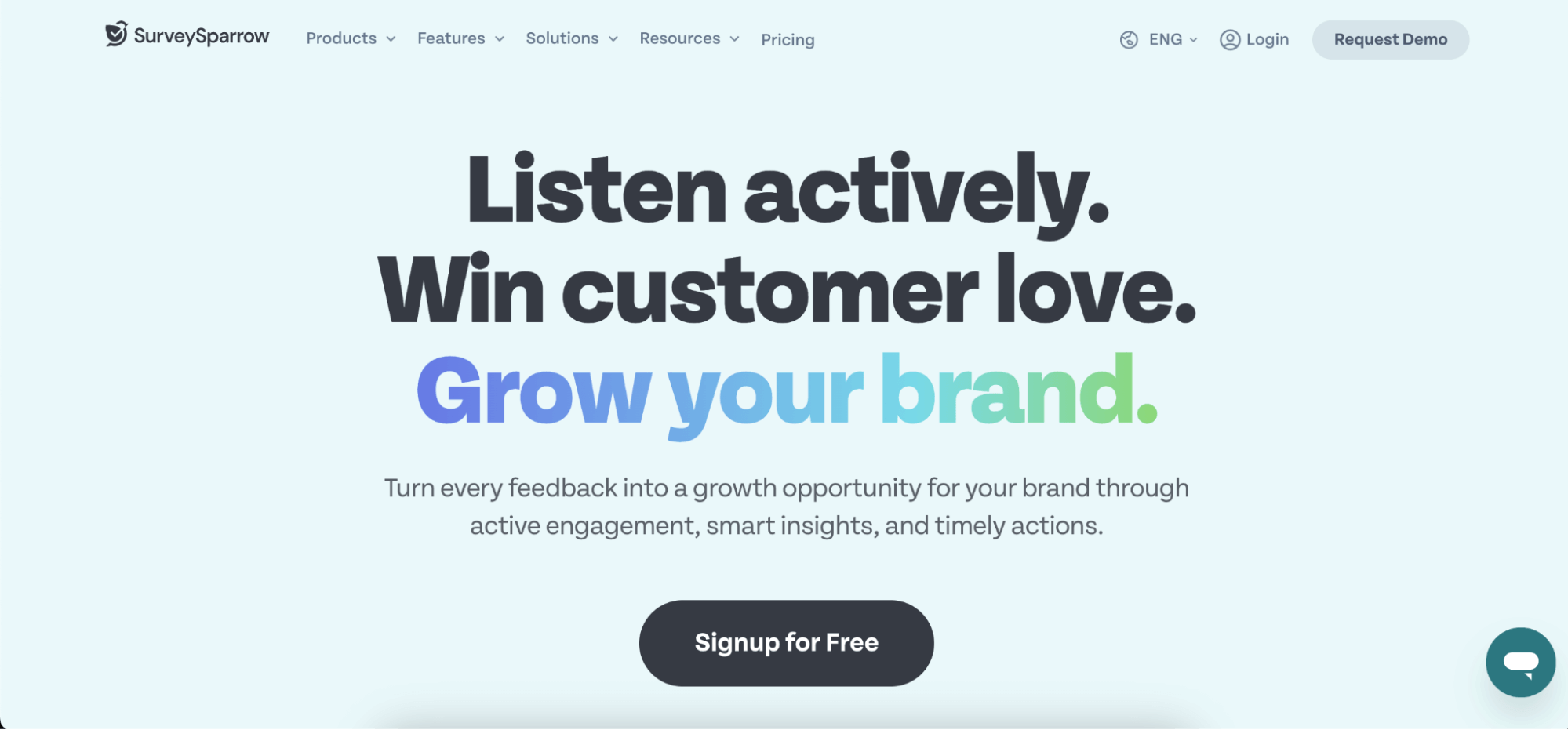
SurveySparrow is an AI survey tool that helps you to create highly personalized surveys with ease. It is suitable for small, mid-size, and large enterprises that are looking to improve their customer experience and satisfaction.
SurveySparrow’s AI Wings helps you to instantly design questions with simple prompts. Another AI tool developed by the company, CogniVue, analyzes customer sentiments and helps in identifying key factors behind a business’s success.
Top features
Create conversational and interactive surveys using emojis, GIFs, and images
25+ native integrations and 1500+ integration options via Zapier
1000+ pre-built templates for easy survey creation
Multi-device compatibility including desktops, smartphones, laptops, and tablets
130+ languages and an inbuilt Google translator
Example use case: Improves Customer Experience
E-commerce platforms can use SurveySparrow to collect post-purchase feedback. The AI tool can analyze the customer’s sentiments immediately after the purchase. It will differentiate the emotions into positive, negative, neutral, or mixed. The company can act upon the negative responses by routing them to the concerned team members. This timely resolution will increase the customer trust and satisfaction on the brand’s services.
Mailmodo
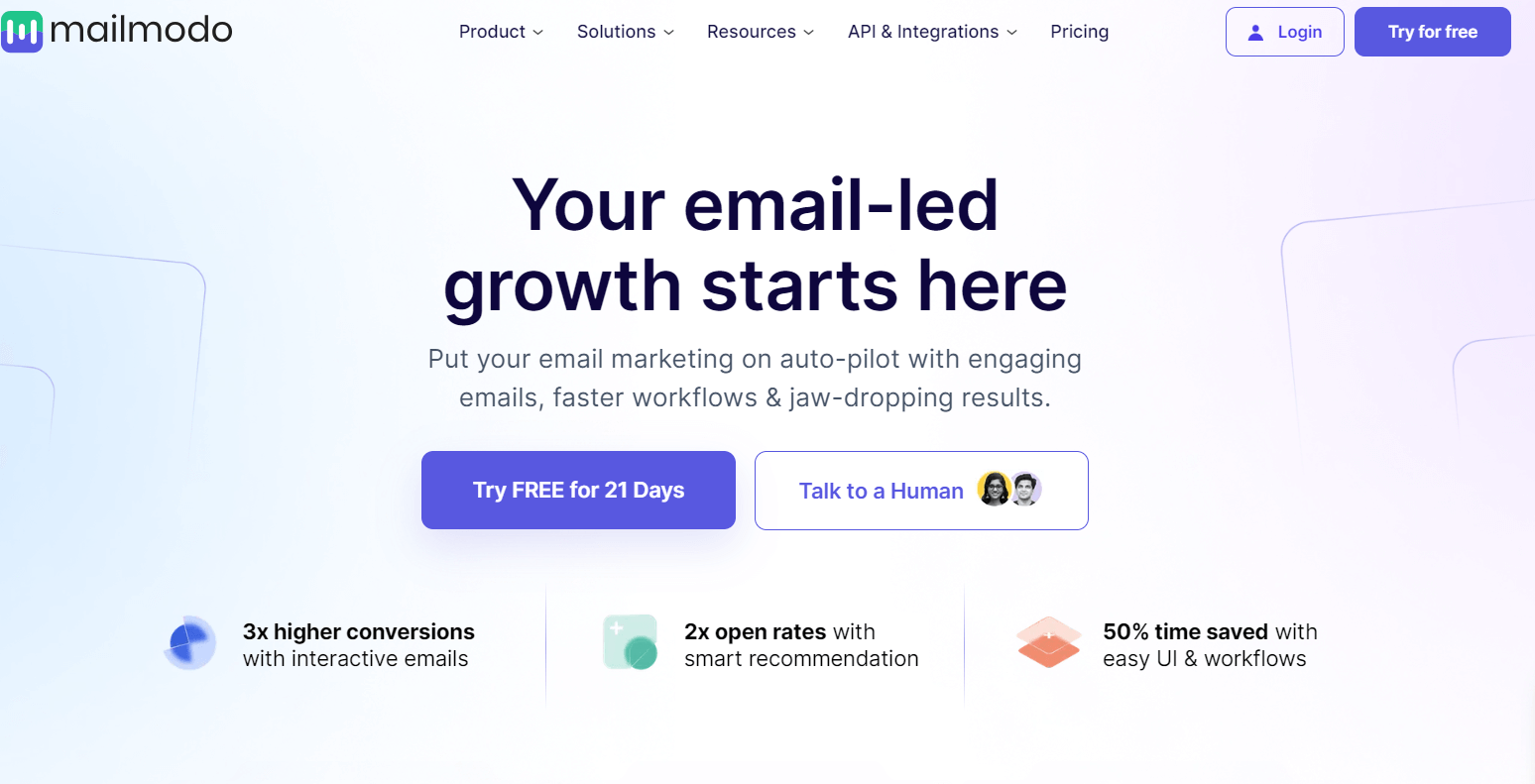 Mailmodo is an all-in-one solution for email marketing that offers advanced features to meet diverse needs.
Mailmodo is an all-in-one solution for email marketing that offers advanced features to meet diverse needs.
You can easily segment customers based on behaviors like abandoned carts and leverage personalized product recommendations. The intuitive dashboard provides detailed insights into campaign performance, including orders, purchases, and overall revenue.
You can also personalize bulk email campaigns with prebuilt customer segments based on Shopify data that updates in real-time, helping you increase the impact of your email campaign by improving targeting.
Top features
Wide selection of templates and interactive widgets to choose from
Ability to set up automated and triggered emails
Visual journey builder
A/B testing to optimize your results
Wide range of integrations
AI subject line generator
Example use case: Product recommendations within emails
With Mailmodo, you can build an interactive carousel in an email, instead of sending your leads a long email filled with product images. This leads to better customer engagement with your emails and helps you maximize your email marketing ROI.
Clean Email
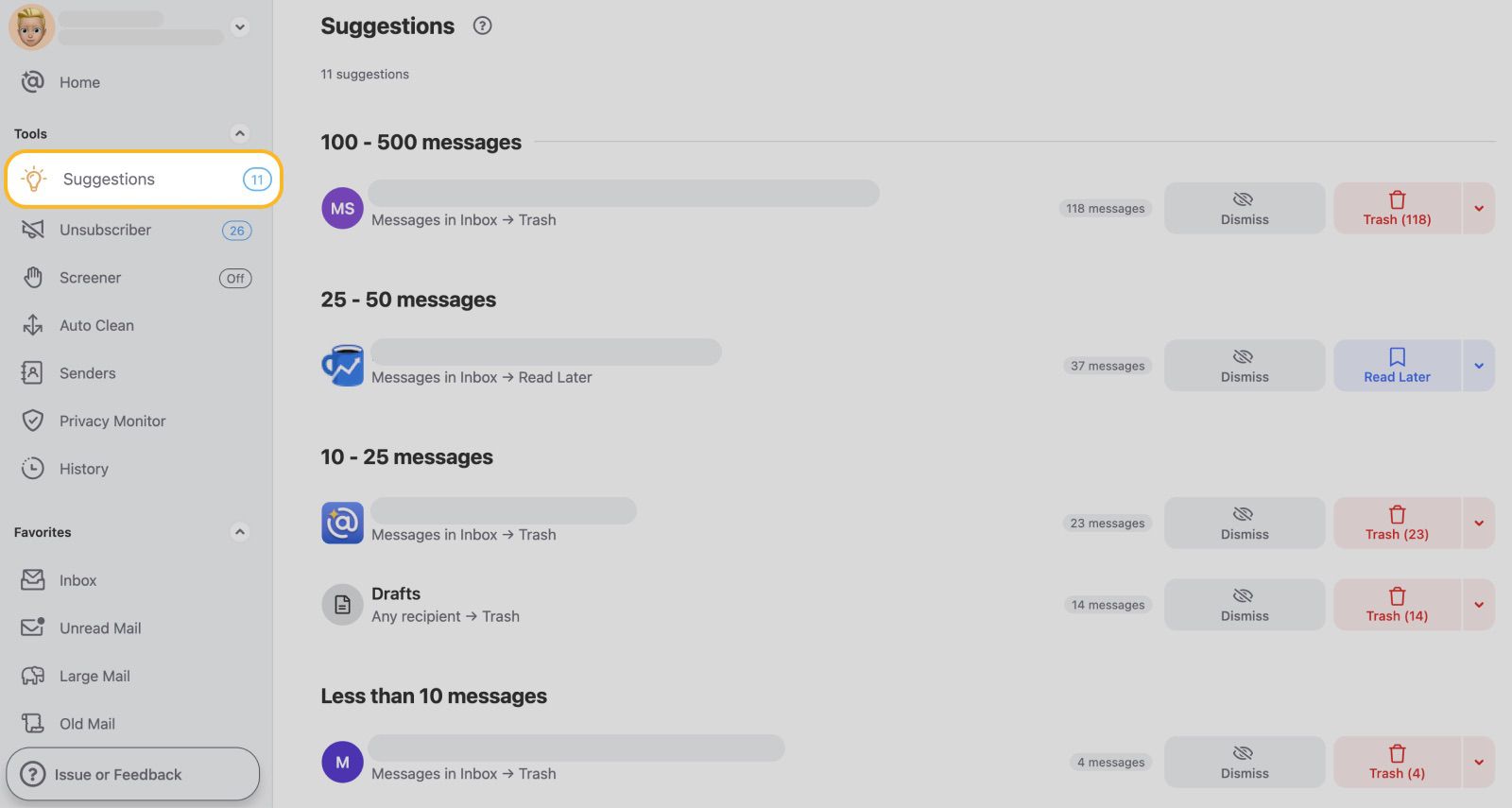
While not a traditional AI tool, Clean Email offers smart automation features that help you declutter and organize your email inbox, making it easier to stay productive. Its intuitive filters and automated actions enhance email management, allowing you to focus on tasks that matter without getting bogged down by an overflowing inbox.
Clean Email's features are ideal for professionals juggling numerous communications daily or teams who rely on email to collaborate and share updates. By setting up automated workflows for repetitive email tasks, you can save time and maintain focus on high-priority projects.
Top features
Intuitive Cleaning Suggestions based on communication patterns and sender activity
Dynamic Smart Folders to group similar emails automatically (e.g., social notifications, automated messages, or top senders)
Auto Clean to set rules for repetitive tasks like deleting or sorting emails
Unsubscriber tool to manage and stop unwanted newsletters effectively
Privacy-first design that ensures no third-party access to your email data
Example use case: Inbox decluttering for better focus
For busy professionals, Clean Email's Auto Clean feature can automatically sort newsletters, promotions, and other non-urgent emails into designated folders. This ensures your inbox remains clutter-free, allowing you to focus on important communications without unnecessary distractions.
Chatbots
Chatbots provide automated responses to your queries so you can quickly access just about any information you need. They also help users get immediate assistance and information without waiting for human intervention.
I researched and tested a handful of popular chatbots available based on the following characteristics:
Response quality
Contextual awareness
Multilingual support
Third-party integrations
ChatGPT
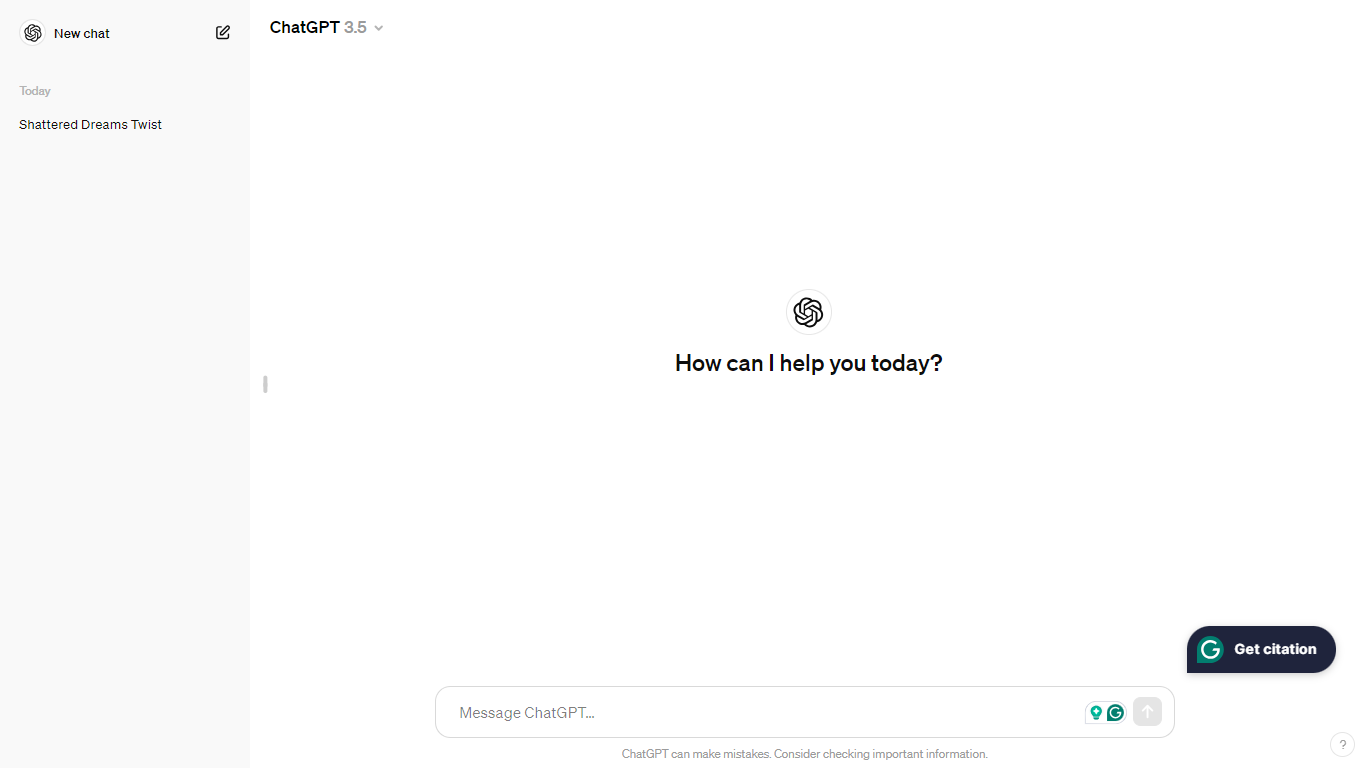
ChatGPT is an advanced conversational AI tool developed by OpenAI based on the GPT-4 architecture. It uses natural language processing (NLP) to understand and generate human-like responses to user queries.
It’s trained on a vast amount of text data from the internet, which makes it a reliable chatbot to help understand a wide range of contexts and topics. Just note that the information ChatGPT provides isn’t always entirely accurate, so it’s important to carry out independent fact-checking when using the tool.
Top features
Understands and processes human language to engage in engaging interactions with users
You can tailor it to specific use cases and industries, making it versatile for various applications
Easily integrates with other software and platforms via APIs
Users from all around the globe can access it as it supports multiple languages
Recognizes and corrects mistakes (eg: spelling errors) during interactions
Assists in drafting, editing, and formatting documents
Example use case: Helping users understand complex concepts
ChatGPT is a great platform to use for understanding a complex concept (say, quantum mechanics) in layman’s terms. It breaks down complicated topics into digestible pieces of information and often uses examples, analogies, or visualizations to illustrate the concepts.
Claude 3
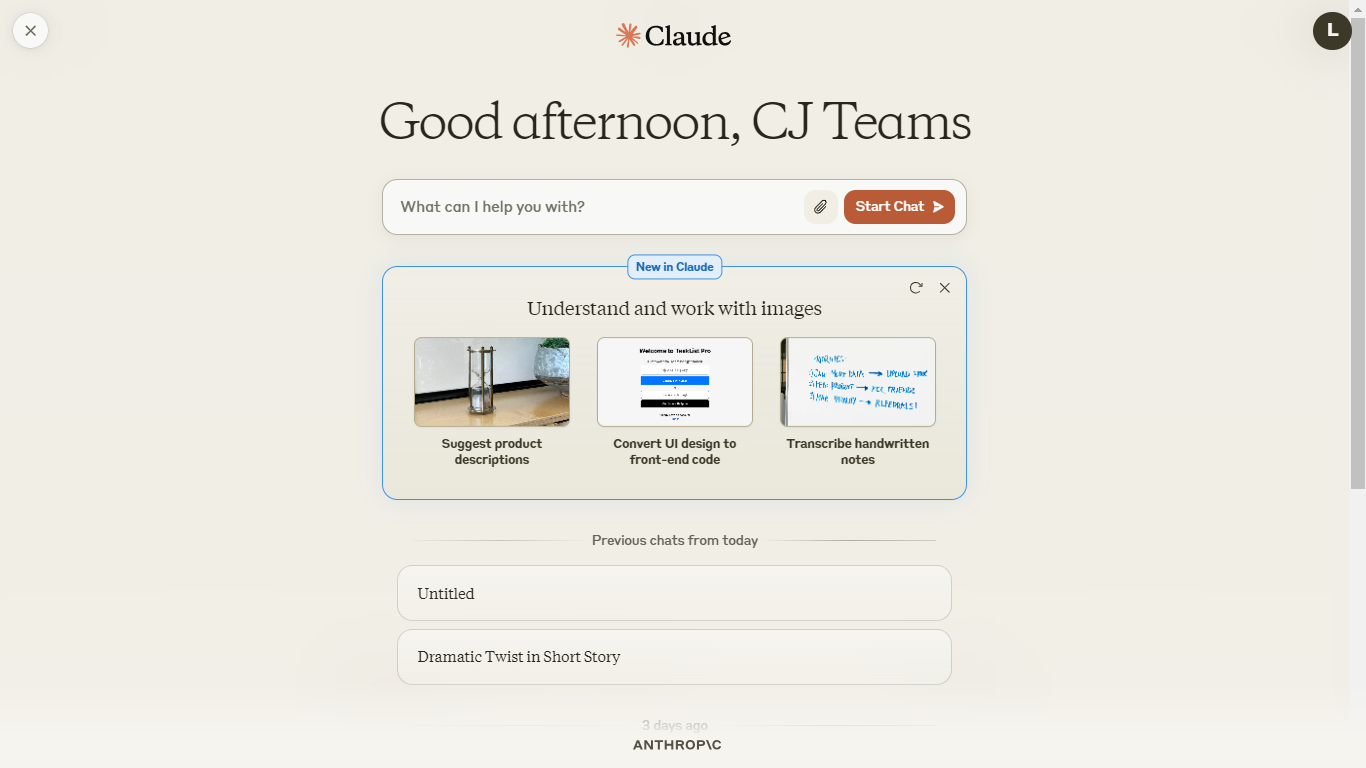
Claude 3 was developed by Anthropic to assist with a wide range of tasks, from writing and analysis to coding and problem-solving. Like ChatGPT, it also engages in natural conversations, answers questions, and provides explanations, all with the aim of solving user problems.
Top features
Advanced natural language processing to understand nuances, context, and intent
Vast knowledge base across diverse fields
Can analyze complex situations, draw logical conclusions, and propose solutions to multifaceted problems
Maintains a good grasp of conversation history and context to enable more coherent responses
Generates responses faster than its predecessors
Has enhanced capabilities in understanding and generating text in multiple languages
Example use case: Enhancing marketing efforts
Small businesses can use Claude 3 to streamline their marketing efforts—from content creation to generating strategies. They can even improve customer service by integrating Claude into their website’s chat function to let it handle initial customer inquiries and offer quick assistance by explaining policies and fielding general questions.
AI content writing tool
The ideal AI co-writer lets you create more polished and personalized content effortlessly.
While not perfect, these tools can come in handy for individuals with limited writing skills and professionals looking to get some inspiration for a specific writing task. I’ve used several factors to rank the best AI content writing tools, including:
Content optimization features
Customization abilities according to your brand’s voice and image
User-friendly interfaces
Grammar and plagiarism checkers
Copy.ai
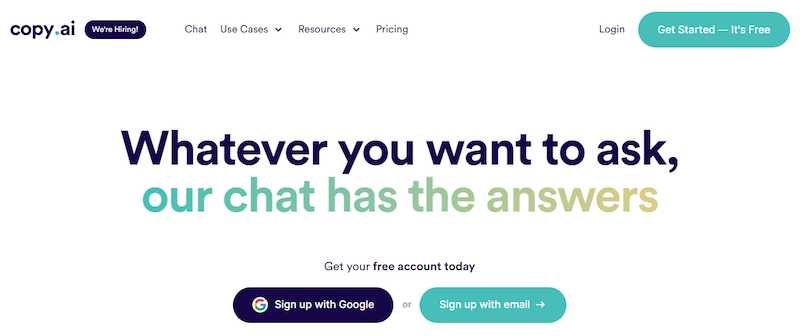
Copy.ai is a generative AI copywriter that helps you create high-quality long-form content that resonates with the quality and style of your brand or business.
It’s very easy to use. Once you sign in to your account, input your writing request and the AI will quickly generate a draft. Just be sure to make your requests as specific as possible for more accurate and relevant results.
Top features
Over 25 pre-installed languages, meaning you can curate content in Chinese, French, English, Spanish, and more
90+ copywriting templates that let you create different content, including articles, blogs, personal letters, and social media captions
Create unique and high-quality content that drives organic traffic
Built-in plagiarism checker that guarantees the uniqueness of your content
Example use case: SEO content creation
Content marketers can use Copy.ai to produce SEO content at scale. This includes creating elaborate briefs using automated SEO research and generating high-quality drafts. It also converts transcripts into polished blog posts and marketing materials to save you hours of manual work.
Jasper
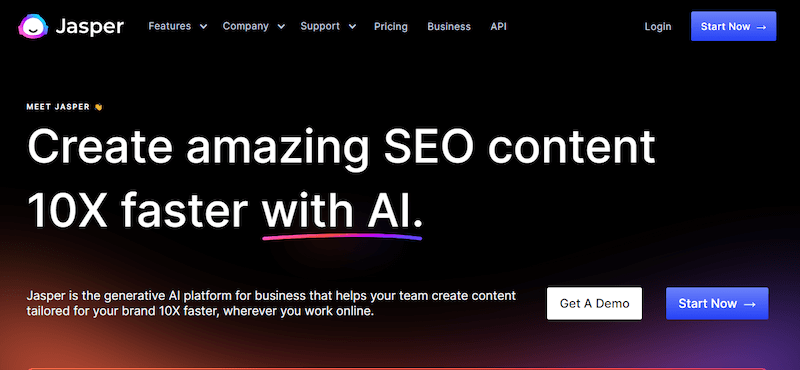
Jasper, formerly Jarvis, is one of the best AI tools for writers and marketers in the business community.
It’s a large language model (LLM) that uses sales data and trained marketing to generate content that aligns with your brand’s voice and style. It’s most suited for writing long-form content like blogs, website copy, and sales emails.
Top features
Highly interactive interface that lets you navigate through its pages with little or no guidance
Make quick and clear voice commands to enhance your writing speed
Seamless integration with world-leading tools like Surfer SEO to help your content rank high on SERPs
Grammarly integration lets you identify and correct grammar, spelling, and punctuation errors
Example use case: Workflow automation
Marketers can use Jasper to automate their marketing workflows. To do so, you can input internal or 3rd party data into Jasper and generate content based on that information.
QuillBot
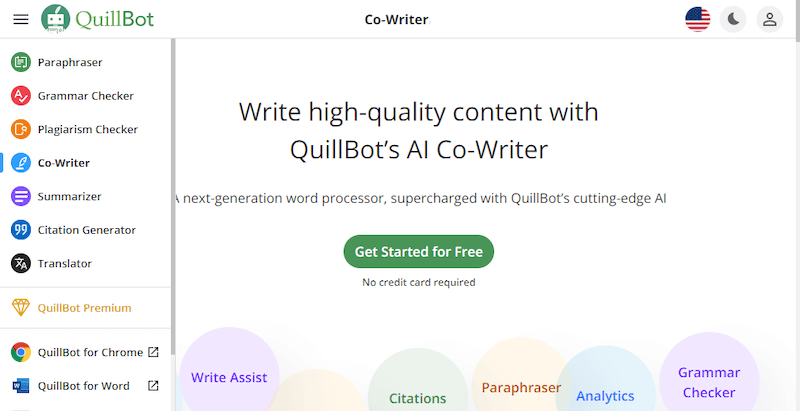
Quillbot’s AI co-writer is a content writing tool that writes and finetunes your copy while ensuring it stays free of plagiarism. It scans your content to detect inconsistencies like broken sentences, misused words, and errors in spelling, punctuation, and grammar.
Additionally, Quillbot is defined to fit different use cases like academic writing, social media posts, and casual personal interactions.
Top features
Condense and repurpose long-form content like articles, essays, and documents without losing the most important points
Rewrite and polish short- and long-form content with a simple prompt
Catch and correct grammatical and punctuation errors when paraphrasing content
Offers Microsoft Word, Google Docs, and Chrome extensions, allowing you full access to its features without having to open a new tab
Example use case: Assists authors with their writing process
QuillBot is a useful tool for authors who are in need of an AI assistant for proofreading or paraphrasing their work in real time. Its co-writer feature allows you to work on two screens simultaneously—so you can use one for writing and the other to research, find citations, paraphrase, and summarize.
AI image and art generators
If AI can generate written content automatically, why not images? AI tools that generate images from a text prompt are opening new opportunities for creativity. They help designers ideate and generate images quickly and give non-creatives the opportunity to create their own graphics and images.
I’m amazed every time I use these tools. Below are some of the fascinating AI image generators worth trying.
Dall-E 2
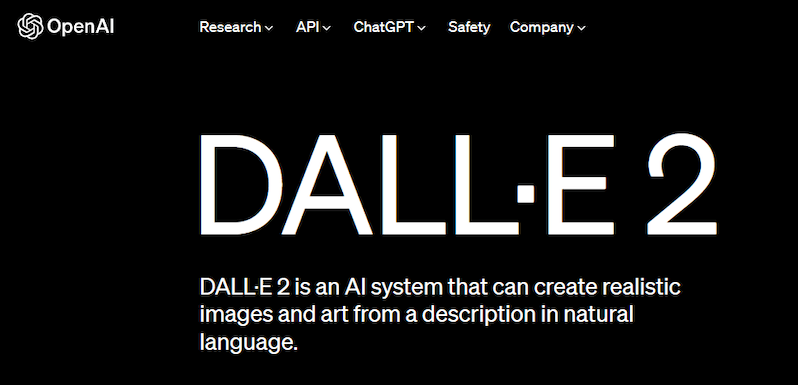
Developed by OpenAI, Dall-E 2 is one of the most sophisticated AI image generators you’ll find. It uses deep learning methodologies to generate highly detailed images from a simple text description.
After creating an image, you can also modify it to meet your needs or change the prompt to generate a new one.
Top features
Interprets textual prompts and transforms them into visually compelling images
User-friendly interface and easy to navigate
Integrates with graphic design applications, web developing software, and other image editing tools to enhance your creative workflows
Deep learning capabilities let it create multiple versions of an existing image
Example use case: Creating mood boards
Dalle-E-2 is a great way to start the ideation process of product development. Though it’s not a replacement for designers, it serves as a mood board where you can collaborate with designers, copywriters, and developers.
Midjourney
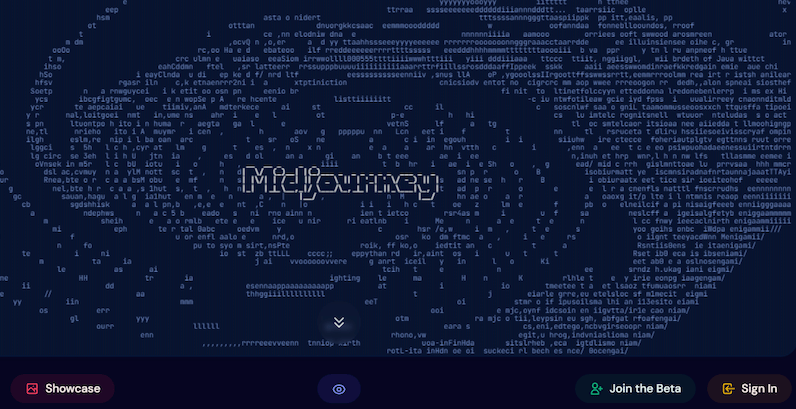
Midjourney is an AI text-to-image generator with constantly evolving features. It helps you create highly realistic AI images by inputting detailed text prompts in its search bar.
Whether you’re an individual with no design background or a seasoned artist looking to enhance your workflows, Midjourney lets you bring your creative imagination to reality with a few written prompts.
Top features
Discord bot creates an array of images that show variations in complexity and detail
Uses deep learning to generate hundreds to thousands of images within a short time frame, making it suitable for large-scale projects and tasks
Uses AI algorithms and machine learning to maintain accuracy and uniformity in image color, composition, and style
Example use case: Educational tool
Midjourney can be used as an interactive learning tool for classrooms. Teachers can create visual aids for subjects like history or science to make learning more engaging for their students.
Adobe Firefly
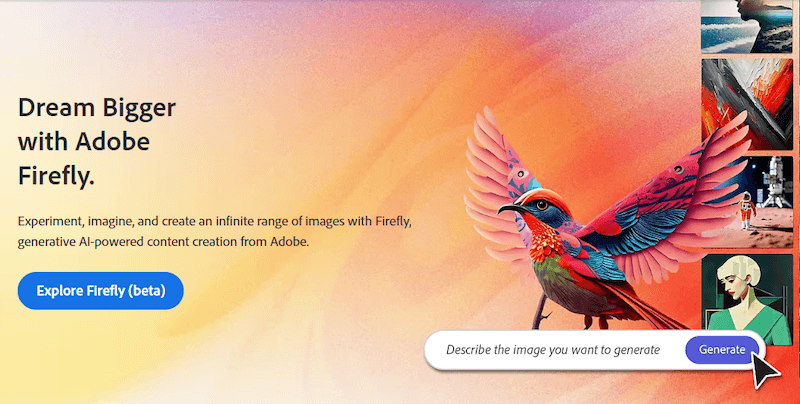
One of the most prominent AI-powered art generators around, Firefly forms part of Adobe’s suite of productivity tools. Its image generation features help bring your imagination to reality while enhancing your creative workflows. You can test and create an unlimited variety of images from a text prompt.
Top features
Create images instantly with detailed text descriptions
Add textures and styles to words and phrases to make stunning works of art
Over 100 pre-installed languages, making it accessible to a diverse range of users
Quickly generate color variations without losing resolution quality, which is valuable for commercial print ads and large-scale projects like billboards and vehicle wraps
Example use case: Mockup creation
Designers, marketers, and product developers can use Firefly to create realistic 3D renderings of products based on text descriptions or rough sketches.
The AI can also place the product design into various realistic environments or scenes. For example, it could show how a new beverage bottle might look on a store shelf or in someone's hand.
Canva AI Art Generator
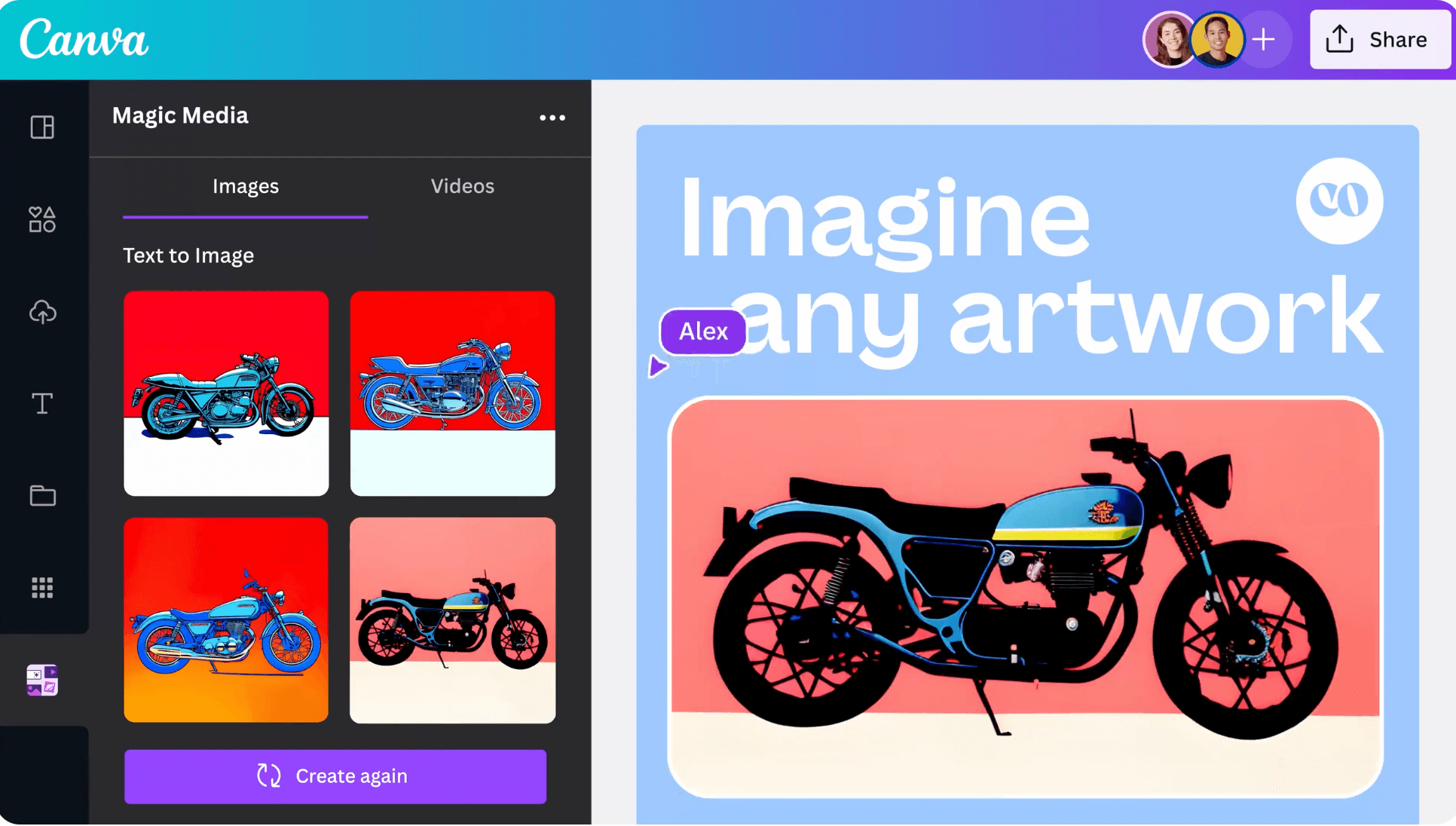
Turn text into art within seconds with Canva's AI art generator app.
The tool helps you find the perfect image for your presentations, social media posts, and website. Cut down hours spent drawing, ideating, or searching for the right image by summarizing your idea into a simple text prompt and seeing the result: beautifully unique artwork.
Top features:
Make precise adjustments with Canva’s photo editor, which lets you add or replace objects and watch as they appear in your artwork
Transform your AI art by layering it with Canva’s filters and effects
Add stickers, text animations, and other design elements to turn your AI-generated art into a design story worth telling
Example use case: Brand creation
You can use Canva to generate visual concepts based on text prompts that describe your brand's values, industry, or desired aesthetic. Create visuals that represent key aspects of your brand's story or values, which can be used on an "about us" page or in promotional materials.
Effortless note-taking and unparalleled productivity at your fingertips
AI tools for video creation
Video content accounts for a significant percentage of online traffic, making it a viable tool for content creators and businesses to stay relevant to consumers. However, video production could be a serious challenge without the ideal AI tool in the equation.
In my quest to rank the best AI tools for video generation, I stumbled upon a handful and selected the top three based on their uniqueness, ease of use, support features, quality of video output, and customization options.
Pictory AI
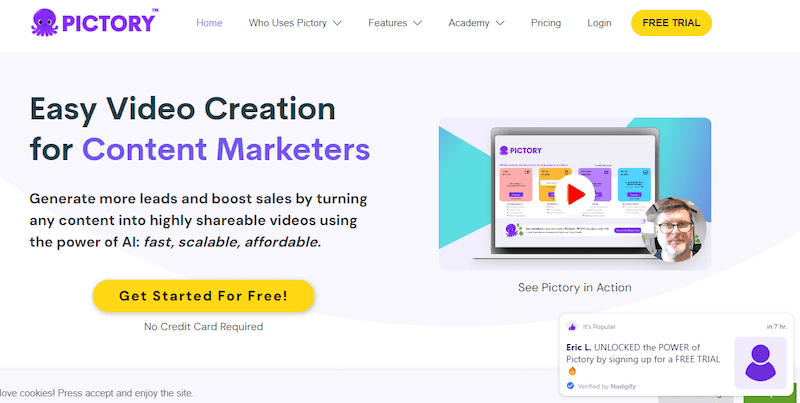
The Pictory AI video generator is an excellent option for content marketers with little or no background knowledge of video production.
By submitting a script or blog post, Pictory automatically generates video content that you can use on your website or social media accounts.
Top features
Edit your webinar, podcast, or Zoom recording easily with text prompts
Create a short video that highlights the key points in your text, then download and share it on your socials
Automatically insert video captions to attract more viewers and subscribers
AI assistant automatically scans through your video content to generate a short-form summary video
Example use case: Turn complex concepts into practical videos
Businesses can use Pictory.ai to generate product demo videos based on a script that highlights the product’s key features and benefits. The platform quickly generates a video, selecting relevant stock footage of people using a similar product in various settings.
Businesses can then customize the video by adding their own product shots and inserting voice-overs or logos.
Synthesia
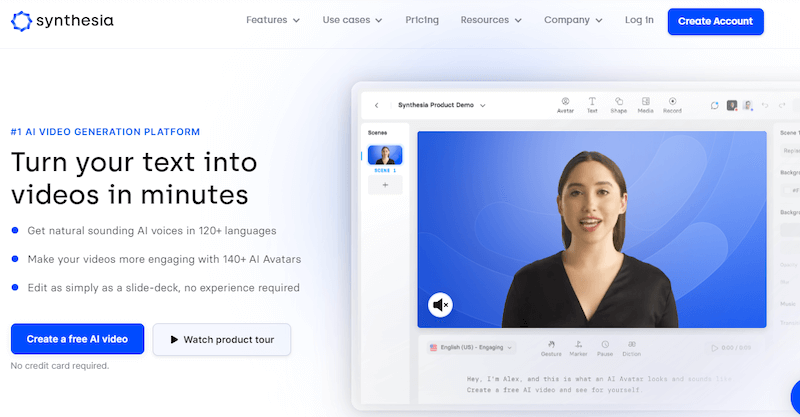
In terms of features, there aren’t many AI video generators that can compare with Synthesia, which has been adopted by industry giants like Google, Nike, and the BBC.
Synthesia STUDIO grants you access to a diverse range of realistic avatars, languages, and voice tones to create professional videos that resonate with your brand’s style and target audience.
Top features
Customize your own avatar or choose from Synthesia's 150+ ethnically distinct AI avatars
Over 120 languages and voice tones, or you can clone your voice and integrate it with your avatar
Free access to millions of soundtracks, images, icons, shapes, and more
Free access to over 65 professionally designed video templates to fast-track your video production
Example use case: Training production
Synthesia can be used to create interactive training programs with realistic simulations, instead of lengthy PDFs that people struggle to read. Just upload a script, select an avatar, and add scene details, and the AI tool will automatically generate the training video for you.
InVideo AI
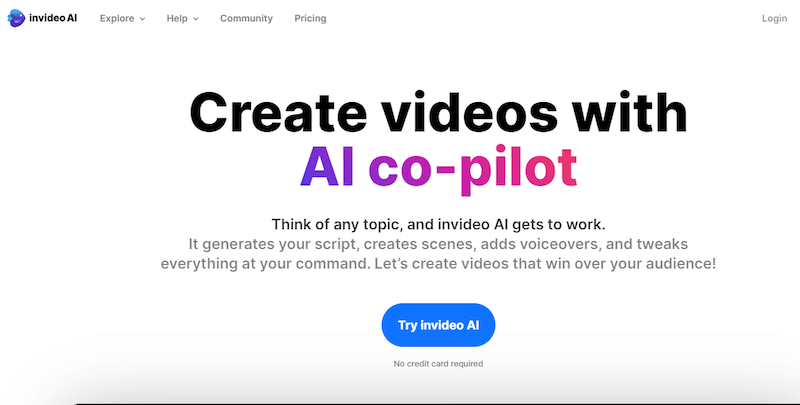
Closing this category is InVideo, an exceptional AI video generator that simplifies the process of creating high quality videos from text prompts. It’s suitable for use cases like online teaching, distance learning, e-learning, and marketing.
Using the Invideo app is incredibly easy. You just input a topic and define your target audience and platform, and the tool will generate a unique video.
Top Features
Captivate your audience with realistic AI talking avatars
5,000+ professionally designed video templates for all platforms and content types
Easily edit your generated videos using text commands
Generate customized video scripts for targeted audiences and transform the scripts into attention-grabbing videos
Example use case: Video production for social media
InVideo AI is trained to generate high-quality videos for all social media platforms, meaning you can create YouTube Shorts, Instagram Reels, and TikTok videos. It also offers copyright-free music to enhance your videos and engage followers.
AI tools for presentations
Presentation platforms have evolved beyond the traditional slideshow experience with new attention-grabbing features. The best AI presentation tools can automatically create presentations with text inputs and even convert slide decks into interactive videos.
To rank the best AI presentation tools, I prioritized the following features and factors:
Template library
Sharing and collaboration
Intuitiveness and customizability
Affordability
After an in-depth analysis, here are my top picks for AI presentation software.
Decktopus
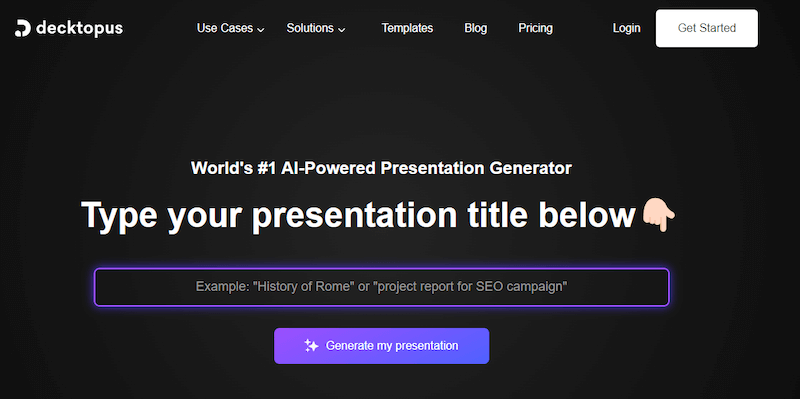
Decktopus is an AI-powered slide deck generator that’s designed to create slide decks for various use cases like sales, marketing, accounting, and more.
It offers an interesting suite of functionalities that eliminates the inconveniences of manually designing and rescaling elements. Additionally, its simple UI lets users create professional-looking presentations with little or no experience.
Top features
Automatically browse through stock photo websites for your desired element with a simple text prompt
Slides note maker for generating slide notes automatically to scale up your presentations
Vast library of templates for different layouts, themes, images, fonts, and other design elements to customize your presentations
Collaborate with your team online or make live streams to optimize the value of your presentations
Example use case: Creating sales proposals
Decktopus offers pre-made templates to help you create branded proposals within a few minutes. You can even analyze your proposals and see which sections got the most attention.
Beautiful.ai
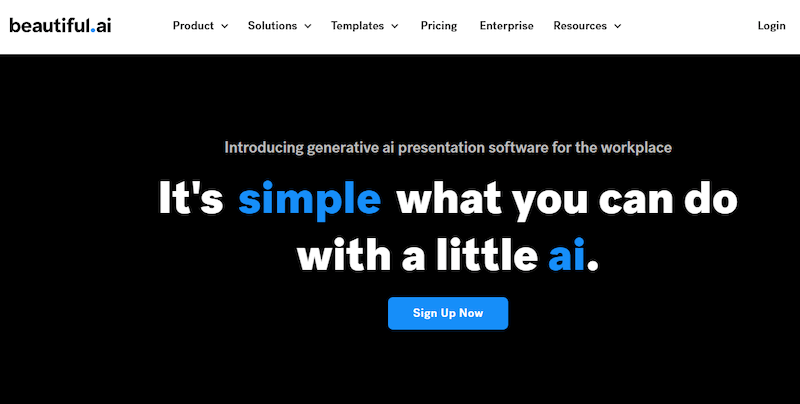
Beautiful.ai is a generative AI presentation software solution for individuals and businesses wanting to enhance their online presentations with advanced features and customizations. It uses machine learning and NLP to analyze presentations, pinpoint the most important elements, and introduce corresponding design concepts seamlessly.
Top features
Hundreds of smart slides and presentation templates to maximize your productivity at inception
Multiple editing features to maintain consistency with style, fonts, colors, and logos
Access to stacks of pre-designed diagrams, charts, and graphs to visualize your data in real-time
Integrates with popular third-party systems like Slack, Dropbox, and Microsoft PowerPoint
Example use case: Create stunning marketing presentations
Beautiful.ai empowers marketing teams to create impressive presentations quickly by instantly adding brand logos, colors, and images. You get access to hundreds of customizable slide templates to create content within minutes.
AI tools for education
With new access to online tools, the way students learn and find information has evolved significantly. The best AI tools for education are designed to make teaching and learning easier, faster, and more enjoyable.
In all my time playing with artificial intelligence tools, these two AI solutions are arguably the most suitable for student productivity.
Socratic
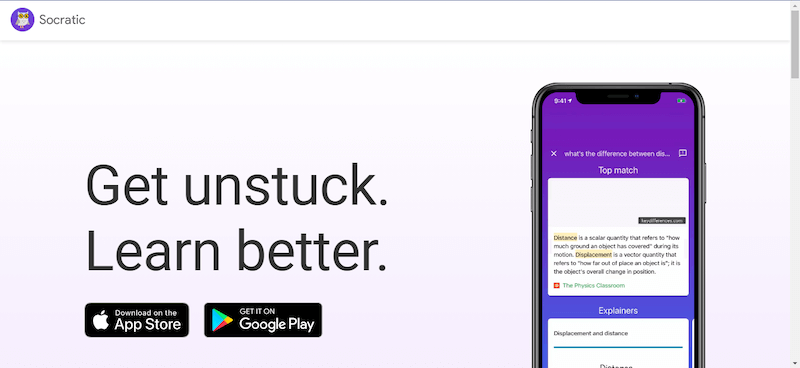
Powered by Google AI, Socratic is a learning app designed to help students with their homework at high school and university levels.
Students only need to ask Socratic a question, and the app will find a variety of educational resources on the web related to their query.
Top features
Generates detailed responses to various queries across different subjects including sciences, literature, math, and social studies
Uses Google AI to analyze audio and text to source the most relevant learning resources for students
Students can access various study guides, videos, and materials to generate insights, draw conclusions, and widen their scope of knowledge
Can be accessed on both major mobile platforms (Android and iOS), making it easy for students to use the tool from their preferred device
Example use case: Professional learning
Working professionals can use Socratic to refresh their knowledge in specific areas, helping them gain new skills and upskill in their current role.
Gradescope

Gradescope is an AI educational platform designed to help teachers grade assessments, whether they’re administered online or in class. Students can also use the app to perform self-assessments and track their progress.
Top features
Supports various assignment types, like problem sets, quizzes, worksheets, and exams
Leave detailed comments when returning assignments and make rubric changes about formerly graded materials
Distribute all graded assignments with a simple click and manage regrade requests and other complaints online to free up time
Gain valuable insights with question- and rubric-level stats to have a grasp of what your students do and don’t know
Example use case: Online learning
It can be hard to give meaningful feedback and keep students in the loop when you don’t see them in person. But with Gradescope, students are instantly notified when graders have assessed an assignment, meaning it’s easy for them to review the feedback and revert based on suggestions.
AI apps for task and project management
Task and project management tools help automate repetitive tasks so you can focus on more important responsibilities. These tools help you and your team organize your tasks and projects while setting deadlines and prioritizing work.
AI for productivity and project management is capable of automating tasks such as sending emails, setting reminders, and updating task statuses.
I’ve chosen the following two task and project management tools available based on the following:
Intuitiveness and easy implementation
Integration with third-party applications
Workflow customization options
Setting task dependencies and milestones
Asana
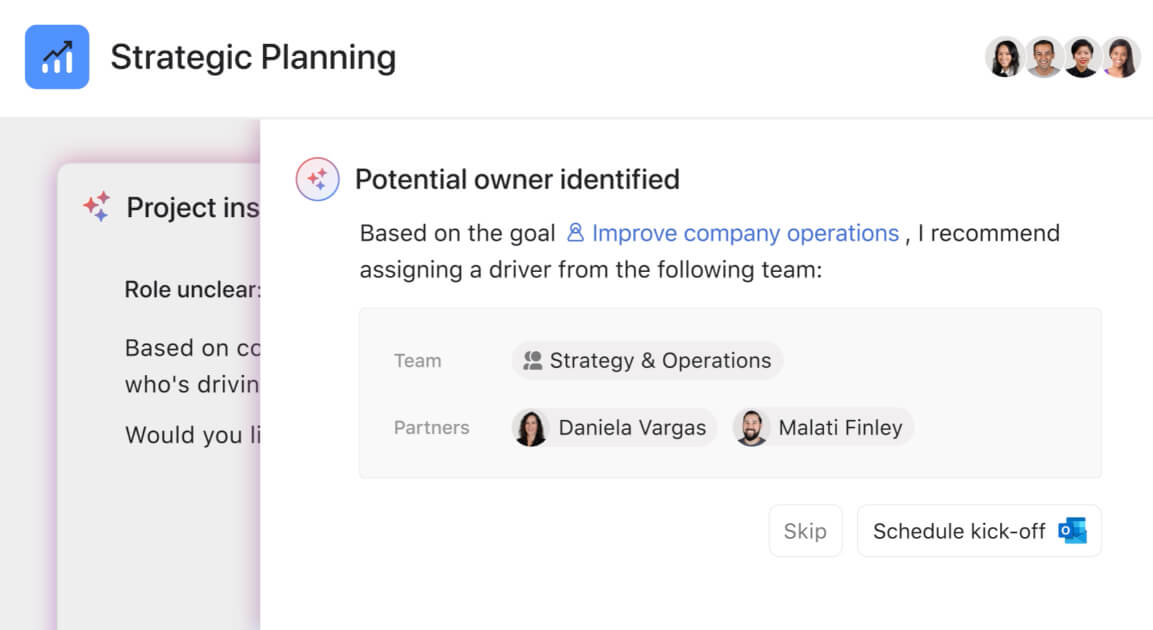
Asana is a powerful task and project management tool that helps teams organize work, track progress, and collaborate better. The platform’s functionality of centralized communication reduces the need for endless email threads and ensures that important information doesn’t slip through the cracks.
Asana’s AI tool acts as an assistant that crafts complex workflows and automates tasks. It’s quick to adapt to your changing needs and requirements and provides creative suggestions to guide you. From strategy planning to product launches, Asana AI helps ensure everyone is up to speed and on track to reach objectives.
Top features
Asana AI for gaining greater clarity on task ownership and status with intelligent insights
Custom rules and workflows to streamline repetitive tasks
Visual representations of project timelines and task dependencies
AI-powered task automation
Progress reports to help you identify bottlenecks in your workflows
Draft SMART goals with the help of AI
AI pulls real-time data to identify roadblocks and risks in your workflows
Native integration with a wide array of third-party applications, including Google Drive, Microsoft Teams, Salesforce, and Slack
Example use case: Employee onboarding
Asana’s dedicated onboarding template helps you ensure clarity and organization for every new employee. Every time someone new joins the team, you can replicate the template and add any additional information needed for that specific employee.
Basecamp
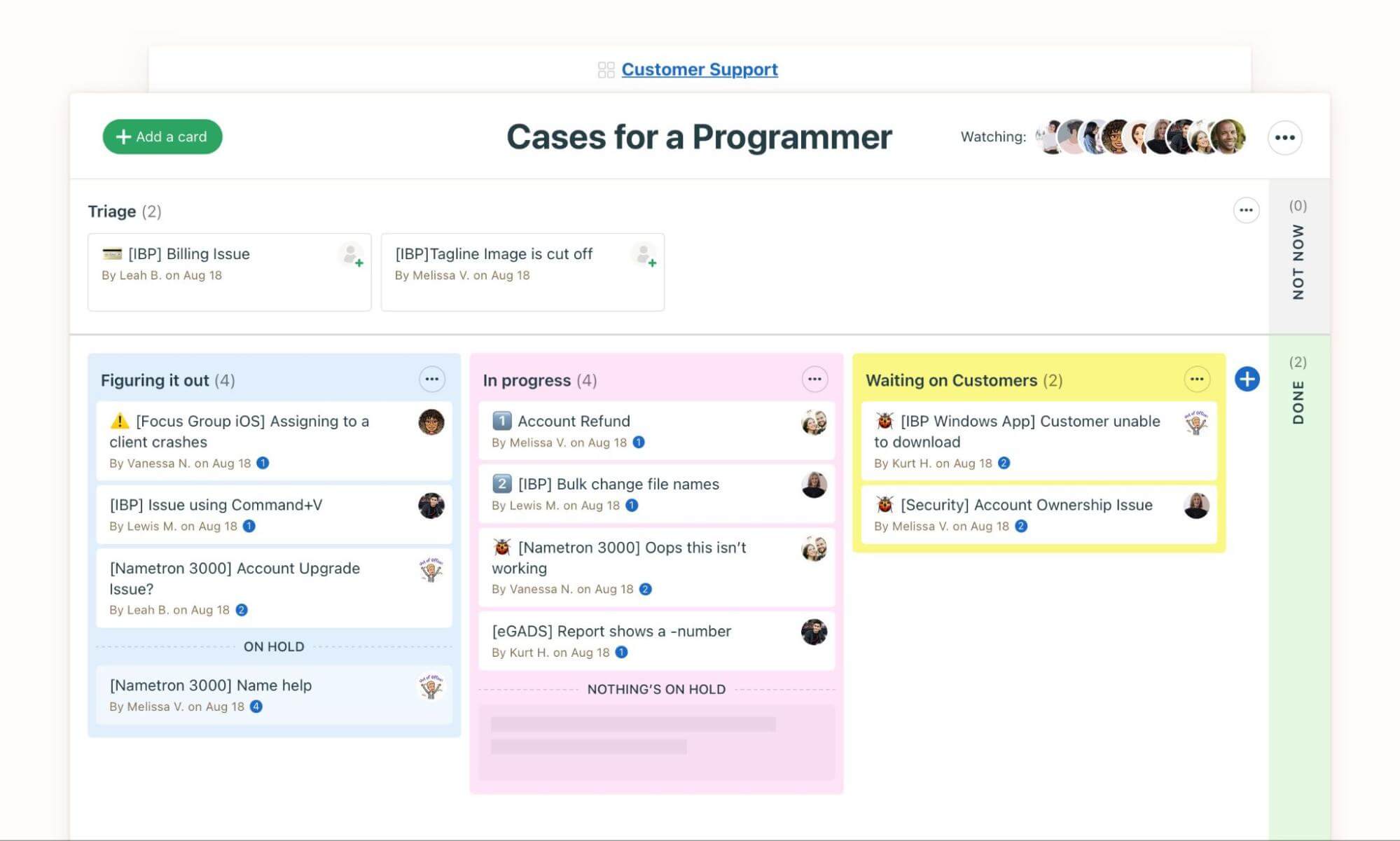
Basecamp is designed for small teams to manage their projects, people, deadlines, and expectations. It helps organize every piece of information so that everything is easily accessible.
You don’t need separate apps for chat, file sharing, or scheduling, as Basecamp handles all these processes from one platform.
With Basecamp, you can automatically check in with your team on a regular basis, instead of doing daily stand-ups. You can access the complete log of one person’s responses and leave your comments.
Top features
Centralized dashboard for your projects, assignments, and schedules
Easy deadline, task, and progress tracking
Real-time group chat to keep everyone in the loop
Mission control to see which projects are on track and which ones need more attention
Card Table tool for Kanban workflow management
Automatically check-in with your team using polls
Built-in integration with AI-powered tools like Figma, Miro, Notion, Slack, and more
Example use case: Product development
Basecamp’s to-do lists can be helpful for a product development team to break down the process into manageable tasks, assign responsibilities, and set deadlines. They can then use message boards to discuss design decisions, share updates, and resolve issues.
How can artificial intelligence boost productivity?
AI tools are an important element in improving productivity in the workplace, which is largely attributable to their ability to adapt to and augment various business operations. Below are some ways you can leverage AI to increase your team’s output without increasing their workload.
1. Automation of mundane tasks
AI technologies are designed to transform manual and repetitive workflows into fully automated processes. Examples include data entry, payroll processing, and scheduling social media posts. This saves you time and lets you focus on tasks that drive more impact, like high-level brainstorming and ideating.
2. Forecasting
AI-powered bots can swiftly decipher huge chunks of data, extract insights, and anticipate future trends that would be time-consuming and tedious for humans to identify. This makes it particularly useful for sales and financial analysis.
3. Data-driven decisions
AI can generate tailored insights and suggestions by analyzing patterns and references. This helps you make data-driven decisions rather than using guesswork and assumptions, leading to better results and increased productivity.
4. Personalized recommendations
AI-driven software can analyze users' behavior and profiles to tailor content and product recommendations, enhancing customer engagement, satisfaction, and conversion rates.
Which AI tool are you choosing for increased productivity?
Your workflows are only as good as the tools you leverage. Apps for productivity don’t just enhance your team’s efficiency, but also provide intelligent insights and foster better collaboration.
And, there you have it, 23 of the best AI tools for productivity to save you time and resources. So, go try the ones that align with your needs and prepare to transform your workflows.
And if AI note-taking and meeting transcription make your top-priority list, consider trying Notta’s free plan.
Use our cutting-edge AI solution to take control of your tasks and optimize your time and focus.